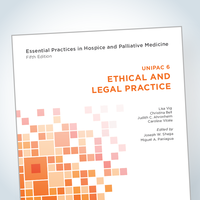Submitted by Angie Forbes on
This book presents medical ethical principles and their application to clinical situations. Topics include the decision-making process when making ethical decisions, instructive and proxy directives, informed consent and research in hospice and palliative care, and providing guidance around misconceptions about opioids, cardiopulmonary resuscitation, withdrawal of artificial ventilation or nutrition and hydration, and suicide or euthanasia.
Upon completion of this self-study program the learner should be better able to
- apply a framework to determine the ethically appropriate options when ethical dilemmas are encountered in clinical practice
- describe what clinicians should consider when determining if a patient has decision-making capacity
- identify preferred qualifications of ethically appropriate surrogate decision-makers
- explain what needs to be considered when deciding to withhold medical care on the basis of medical futility, and why this can be problematic
- provide guidance to patients and families about the risks, benefits, and alternatives to artificial nutrition and hydration
- differentiate between palliative sedation, physician assisted death, and euthanasia
- identify the risk factors for moral distress in challenging clinical situations
- recognize ways to maintain professional boundaries when providing palliative and hospice care
Authors:
Lisa K. Vig, MD MPH
Judith C. Ahronheim, MD
Christina Bell, MD
Caroline A. Vitale, MD
No CME credits available
Member Price: $65
List Price: $85

